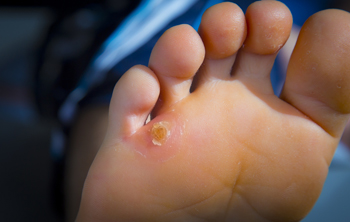 Keratin is a tough, fibrous protein that is found in the skin. When the skin is exposed to excessive pressure, or is inflamed or irritated, the skin responds by producing extra layers of keratin to protect the damaged area. This is known as hyperkeratosis, and often happens to the skin on the soles of the feet and between the toes, creating calluses and corns. Calluses are areas of thickened skin that are typically uniform in their thickness. Corns are small, hard bumps that usually have a hard center with an outer ring of hardened tissue that is slightly softer than the center. Both calluses and corns can cause discomfort. If you have painful calluses, corns, or otherwise thickened, hardened skin on your feet, please consult with a podiatrist.
Keratin is a tough, fibrous protein that is found in the skin. When the skin is exposed to excessive pressure, or is inflamed or irritated, the skin responds by producing extra layers of keratin to protect the damaged area. This is known as hyperkeratosis, and often happens to the skin on the soles of the feet and between the toes, creating calluses and corns. Calluses are areas of thickened skin that are typically uniform in their thickness. Corns are small, hard bumps that usually have a hard center with an outer ring of hardened tissue that is slightly softer than the center. Both calluses and corns can cause discomfort. If you have painful calluses, corns, or otherwise thickened, hardened skin on your feet, please consult with a podiatrist.
Corns can make walking very painful and should be treated immediately. If you have questions regarding your feet and ankles, contact Brian Shwer, DPM of Southaven Foot Clinic. Our doctor will treat your foot and ankle needs.
Corns: What Are They? And How Do You Get Rid of Them?
Corns are thickened areas on the skin that can become painful. They are caused by excessive pressure and friction on the skin. Corns press into the deeper layers of the skin and are usually round in shape.
Ways to Prevent Corns
There are many ways to get rid of painful corns such as:
Treating Corns
Although most corns slowly disappear when the friction or pressure stops, this isn’t always the case. Consult with your podiatrist to determine the best treatment option for your case of corns.
If you have any questions please feel free to contact our office located in Southaven, MS . We offer the newest diagnostic and treatment technologies for all your foot and ankle needs.
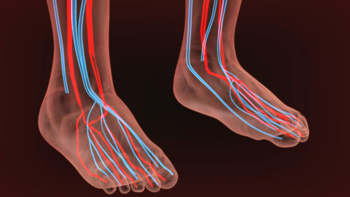 When poor circulation, or reduced blood flow affects your lower limbs, you may notice your feet feeling cold or numb and your skin turning red, blue, purple, or white. You may also notice dry skin, hair loss on the legs or feet, weakened toenails, and slow wound healing. There are many possible causes for poor circulation in the feet. Both Raynaud’s disease and acrocyanosis cause blood vessels in the extremities to constrict, leading to reduced blood flow and the affected area becoming cold, numb, and discolored. Diabetes damages the blood vessels, affecting circulation. Arteriosclerosis, in which the arteries harden due to plaque buildup, and peripheral artery disease, which occurs when arteriosclerosis progresses without treatment, are also very common culprits of impaired blood flow to the feet. If you have the symptoms of poor circulation in your feet, it is suggested that you seek the care of a podiatrist.
When poor circulation, or reduced blood flow affects your lower limbs, you may notice your feet feeling cold or numb and your skin turning red, blue, purple, or white. You may also notice dry skin, hair loss on the legs or feet, weakened toenails, and slow wound healing. There are many possible causes for poor circulation in the feet. Both Raynaud’s disease and acrocyanosis cause blood vessels in the extremities to constrict, leading to reduced blood flow and the affected area becoming cold, numb, and discolored. Diabetes damages the blood vessels, affecting circulation. Arteriosclerosis, in which the arteries harden due to plaque buildup, and peripheral artery disease, which occurs when arteriosclerosis progresses without treatment, are also very common culprits of impaired blood flow to the feet. If you have the symptoms of poor circulation in your feet, it is suggested that you seek the care of a podiatrist.
Poor circulation is a serious condition and needs immediate medical attention. If you have any concerns with poor circulation in your feet contact Brian Shwer, DPM of Southaven Foot Clinic. Our doctor will treat your foot and ankle needs.
Poor Circulation in the Feet
Poor blood circulation in the feet and legs is can be caused by peripheral artery disease (PAD), which is the result of a buildup of plaque in the arteries.
Plaque buildup or atherosclerosis results from excess calcium and cholesterol in the bloodstream. This can restrict the amount of blood which can flow through the arteries. Poor blood circulation in the feet and legs are sometimes caused by inflammation in the blood vessels, known as vasculitis.
Causes
Lack of oxygen and oxygen from poor blood circulation restricts muscle growth and development. It can also cause:
Those who have diabetes or smoke are at greatest risk for poor circulation, as are those who are over 50. If you have poor circulation in the feet and legs it may be caused by PAD and is important to make changes to your lifestyle in order to reduce risk of getting a heart attack or stroke. Exercise and maintaining a healthy lifestyle will dramatically improve conditions.
As always, see a podiatrist as he or she will assist in finding a regimen that suits you. A podiatrist can also prescribe you any needed medication.
If you have any questions please feel free to contact our office located in Southaven, MS . We offer the newest diagnostic and treatment technologies for all your foot and ankle needs.
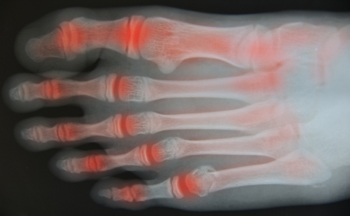 Like other parts of your body, the feet contain many joints that can be affected by the various types of arthritis. Osteoarthritis, which is characterized by age-related degeneration of the cartilage that cushions your joints, can affect the joints of the feet and cause pain, swelling, stiffness, and a reduced range of motion. Rheumatoid arthritis, an autoimmune condition that is not related to aging, is characterized by pain, stiffness, and swelling of the joints, as well as fever, fatigue, and unexplained weight loss. Psoriatic arthritis, which affects people who have a skin condition called psoriasis, can cause swelling, pain, and stiffness in the joints, extreme fatigue, and changes in the nails. Gout, an arthritis that often affects the big toe joint and can flare up and then go away, may cause swelling, pain, redness, and warmth in the affected joint. If you have the symptoms of arthritis in your feet, it is suggested that you consult with a podiatrist.
Like other parts of your body, the feet contain many joints that can be affected by the various types of arthritis. Osteoarthritis, which is characterized by age-related degeneration of the cartilage that cushions your joints, can affect the joints of the feet and cause pain, swelling, stiffness, and a reduced range of motion. Rheumatoid arthritis, an autoimmune condition that is not related to aging, is characterized by pain, stiffness, and swelling of the joints, as well as fever, fatigue, and unexplained weight loss. Psoriatic arthritis, which affects people who have a skin condition called psoriasis, can cause swelling, pain, and stiffness in the joints, extreme fatigue, and changes in the nails. Gout, an arthritis that often affects the big toe joint and can flare up and then go away, may cause swelling, pain, redness, and warmth in the affected joint. If you have the symptoms of arthritis in your feet, it is suggested that you consult with a podiatrist.
Arthritis can be a difficult condition to live with. If you are seeking treatment, contact Brian Shwer, DPM from Southaven Foot Clinic. Our doctor can provide the care you need to keep you pain-free and on your feet.
Arthritic Foot Care
Arthritis is a joint disorder that involves the inflammation of different joints in your body, such as those in your feet. Arthritis is often caused by a degenerative joint disease and causes mild to severe pain in all affected areas. In addition to this, swelling and stiffness in the affected joints can also be a common symptom of arthritis.
In many cases, wearing ill-fitting shoes can worsen the effects and pain of arthritis. Wearing shoes that have a lower heel and extra room can help your feet feel more comfortable. In cases of rheumatoid arthritis, the arch in your foot may become problematic. Buying shoes with proper arch support that contour to your feet can help immensely.
Alleviating Arthritic Pain
It is best to see your doctor for the treatment that is right for your needs and symptoms. Conditions vary, and a podiatrist can help you determine the right method of care for your feet.
If you have any questions, please feel free to contact our office located in Southaven, MS . We offer the newest diagnostic tools and technology to treat your foot and ankle needs.
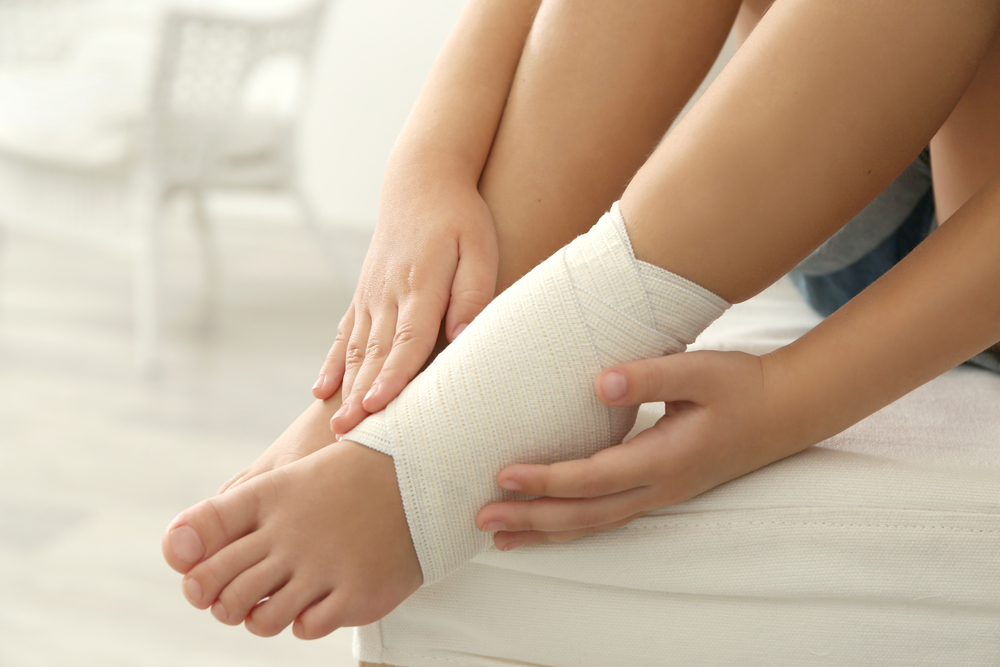 An ankle sprain is a common injury that occurs when one or more ligaments in the ankle are overstretched or torn. The severity of an ankle injury depends on the extent of damage to the affected ligaments. Ankle sprains are generally classified into three categories. A Grade 1 ankle sprain is mild and is characterized by stretching or microscopic tears in the ligaments, mild pain, slight swelling, and light bruising. A Grade 2 sprain is considered moderate and involves partial tearing of the ligament, abnormal looseness in the ankle joint, moderate pain, noticeable swelling, bruising, and joint instability when bearing weight on the ankle. A Grade 3 sprain is severe and occurs when the ligament tears completely. Symptoms include severe pain and bruising, significant swelling, and major joint instability. If you have sprained your ankle, it is recommended that you seek the care of a podiatrist.
An ankle sprain is a common injury that occurs when one or more ligaments in the ankle are overstretched or torn. The severity of an ankle injury depends on the extent of damage to the affected ligaments. Ankle sprains are generally classified into three categories. A Grade 1 ankle sprain is mild and is characterized by stretching or microscopic tears in the ligaments, mild pain, slight swelling, and light bruising. A Grade 2 sprain is considered moderate and involves partial tearing of the ligament, abnormal looseness in the ankle joint, moderate pain, noticeable swelling, bruising, and joint instability when bearing weight on the ankle. A Grade 3 sprain is severe and occurs when the ligament tears completely. Symptoms include severe pain and bruising, significant swelling, and major joint instability. If you have sprained your ankle, it is recommended that you seek the care of a podiatrist.
Ankle sprains are common but need immediate attention. If you need your feet checked, contact Brian Shwer, DPM from Southaven Foot Clinic. Our doctor can provide the care you need to keep you pain-free and on your feet.
How Does an Ankle Sprain Occur?
Ankle sprains take place when the ligaments in your ankle are torn or stretched beyond their limits. There are multiple ways that the ankle can become injured, including twisting or rolling over onto your ankle, putting undue stress on it, or causing trauma to the ankle itself.
What Are the Symptoms?
Preventing a Sprain
Treatment of a Sprain
Treatment of a sprain depends on the severity. Many times, people are told to rest and remain off their feet completely, while others are given an air cast. If the sprain is very severe, surgery may be required.
If you have suffered an ankle sprain previously, you may want to consider additional support such as a brace and regular exercises to strengthen the ankle.
If you have any questions please feel free to contact our office located in Southaven, MS . We offer the newest diagnostic and treatment technologies for all your foot and ankle needs.
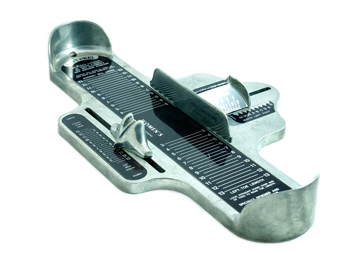 People who enjoy the sport of golf are often unaware of the importance of wearing the correct golf shoes. Research has shown the average golfer to walk approximately 10,000 steps, and it is beneficial to wear golf shoes that fit correctly. Using a Brannock device will help you to determine a proper foot measurement. If the second toe is longer than the big toe, it is suggested to increase by a half size. Additionally, it is advised to measure the feet at the end of the day, when they are at their largest. The inside of the shoes and the cleats can help you to understand what type of walker you are, and this is helpful in choosing the correct golf shoes. If you would like more information about how to purchase golf shoes, please consult with a podiatrist who can provide you with helpful information.
People who enjoy the sport of golf are often unaware of the importance of wearing the correct golf shoes. Research has shown the average golfer to walk approximately 10,000 steps, and it is beneficial to wear golf shoes that fit correctly. Using a Brannock device will help you to determine a proper foot measurement. If the second toe is longer than the big toe, it is suggested to increase by a half size. Additionally, it is advised to measure the feet at the end of the day, when they are at their largest. The inside of the shoes and the cleats can help you to understand what type of walker you are, and this is helpful in choosing the correct golf shoes. If you would like more information about how to purchase golf shoes, please consult with a podiatrist who can provide you with helpful information.
Finding a properly-fitting shoe is important in reducing injuries and preventing foot problems. For more information about treatment, contact Brian Shwer, DPM from Southaven Foot Clinic. Our doctor will treat your foot and ankle needs.
Proper Shoe Fitting
A common concern when it comes to foot health, having properly fitted shoes can help prevent injuries to the foot. Out feet affect our posture and gait, which in turn affects the biomechanics and overall bodily structure. With 33 joints, 26 bones, and over 100 ligaments, the potential for serious injury is much greater than one realizes. Although the feet cease growth in adulthood, they still change shape as they mature. Here are some factors to consider when it comes to investing in proper fitting shoes:
Keeping in mind how shoes fit the biomechanics of your body, properly-fitting shoes are vitally important. Fortunately, it is not difficult to acquire footwear that fits correctly. Be sure to wear shoes that support the overall structure of your body. Do your feet a favor and invest in several pairs of well-fitted shoes today.
If you have any questions please feel free to contact our office located in Southaven, MS . We offer the newest diagnostic and treatment technologies for all your foot and ankle needs.
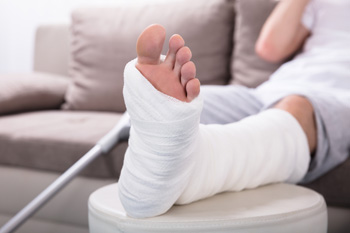 A broken foot can happen as a result of falling or enduring a sudden injury. The healing process can begin when a proper diagnosis is performed, which generally means having an X-ray taken. This is commonly followed by wearing a protective boot or cast, and it may help existing swelling when the foot is frequently elevated. The boot or cast may aid in walking while attempting to complete daily activities. If the fracture is severe, and the bone is protruding from the skin, surgery may be necessary for proper healing. It is suggested that you consult with a podiatrist if you have broken your foot.
A broken foot can happen as a result of falling or enduring a sudden injury. The healing process can begin when a proper diagnosis is performed, which generally means having an X-ray taken. This is commonly followed by wearing a protective boot or cast, and it may help existing swelling when the foot is frequently elevated. The boot or cast may aid in walking while attempting to complete daily activities. If the fracture is severe, and the bone is protruding from the skin, surgery may be necessary for proper healing. It is suggested that you consult with a podiatrist if you have broken your foot.
A broken foot requires immediate medical attention and treatment. If you need your feet checked, contact Brian Shwer, DPM from Southaven Foot Clinic. Our doctor can provide the care you need to keep you pain-free and on your feet.
Broken Foot Causes, Symptoms, and Treatment
A broken foot is caused by one of the bones in the foot typically breaking when bended, crushed, or stretched beyond its natural capabilities. Usually the location of the fracture indicates how the break occurred, whether it was through an object, fall, or any other type of injury.
Common Symptoms of Broken Feet:
Those that suspect they have a broken foot shoot seek urgent medical attention where a medical professional could diagnose the severity.
Treatment for broken bones varies depending on the cause, severity and location. Some will require the use of splints, casts or crutches while others could even involve surgery to repair the broken bones. Personal care includes the use of ice and keeping the foot stabilized and elevated.
If you have any questions please feel free to contact our office located in Southaven, MS . We offer the newest diagnostic and treatment technologies for all your foot and ankle needs.
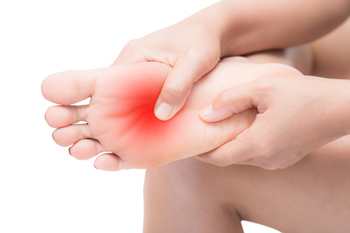 Peripheral neuropathy is the result of nerve damage that occurs in the extremities such as the hands and feet. When this peripheral neuropathy is inherited, it is known as Charcot-Marie-Tooth, or CMT. Charcot-Marie-Tooth affects people worldwide. While CMT is not life threatening, it does lead to the loss of mobility and function in the extremities as the nerves degenerate. There are many different genetic causes for CMT, but most cases have a variety of similar symptoms. These symptoms include having high arched feet, structural foot deformities and weakening of the muscles. Patients who are suffering from CMT should consult with a podiatrist for treatment options that can help improve function. Treatment options may include physical therapy, bracing, wearing properly fitting footwear, and maintaining a healthy weight.
Peripheral neuropathy is the result of nerve damage that occurs in the extremities such as the hands and feet. When this peripheral neuropathy is inherited, it is known as Charcot-Marie-Tooth, or CMT. Charcot-Marie-Tooth affects people worldwide. While CMT is not life threatening, it does lead to the loss of mobility and function in the extremities as the nerves degenerate. There are many different genetic causes for CMT, but most cases have a variety of similar symptoms. These symptoms include having high arched feet, structural foot deformities and weakening of the muscles. Patients who are suffering from CMT should consult with a podiatrist for treatment options that can help improve function. Treatment options may include physical therapy, bracing, wearing properly fitting footwear, and maintaining a healthy weight.
Neuropathy
Neuropathy can be a potentially serious condition, especially if it is left undiagnosed. If you have any concerns that you may be experiencing nerve loss in your feet, consult with Brian Shwer, DPM from Southaven Foot Clinic. Our doctor will assess your condition and provide you with quality foot and ankle treatment for neuropathy.
What Is Neuropathy?
Neuropathy is a condition that leads to damage to the nerves in the body. Peripheral neuropathy, or neuropathy that affects your peripheral nervous system, usually occurs in the feet. Neuropathy can be triggered by a number of different causes. Such causes include diabetes, infections, cancers, disorders, and toxic substances.
Symptoms of Neuropathy Include:
Those with diabetes are at serious risk due to being unable to feel an ulcer on their feet. Diabetics usually also suffer from poor blood circulation. This can lead to the wound not healing, infections occurring, and the limb may have to be amputated.
Treatment
To treat neuropathy in the foot, podiatrists will first diagnose the cause of the neuropathy. Figuring out the underlying cause of the neuropathy will allow the podiatrist to prescribe the best treatment, whether it be caused by diabetes, toxic substance exposure, infection, etc. If the nerve has not died, then it’s possible that sensation may be able to return to the foot.
Pain medication may be issued for pain. Electrical nerve stimulation can be used to stimulate nerves. If the neuropathy is caused from pressure on the nerves, then surgery may be necessary.
If you have any questions, please feel free to contact our office located in Southaven, MS . We offer the newest diagnostic and treatment technologies for all your foot care needs.
 Swollen feet are a common result of pregnancy. While the fetus puts extra weight on the feet and legs, circulation also slows and fluid can build up. This ultimately leads to the feet swelling. Pregnant women whose feet have swollen should avoid standing for long periods of time, slightly elevate the feet, limit salt intake, keep hydrated, wear comfortable shoes and socks, and massage the feet regularly. While foot swelling is normal during pregnancy, a sudden or rapid increase in swelling should be checked by a podiatrist. It is also important to seek medical attention if one foot is more swollen than the other, there is pain or heat in the calf, or the skin is red or discolored.
Swollen feet are a common result of pregnancy. While the fetus puts extra weight on the feet and legs, circulation also slows and fluid can build up. This ultimately leads to the feet swelling. Pregnant women whose feet have swollen should avoid standing for long periods of time, slightly elevate the feet, limit salt intake, keep hydrated, wear comfortable shoes and socks, and massage the feet regularly. While foot swelling is normal during pregnancy, a sudden or rapid increase in swelling should be checked by a podiatrist. It is also important to seek medical attention if one foot is more swollen than the other, there is pain or heat in the calf, or the skin is red or discolored.
Pregnant women with swollen feet can be treated with a variety of different methods that are readily available. For more information about other cures for swollen feet during pregnancy, consult with Brian Shwer, DPM from Southaven Foot Clinic. Our doctor will attend to all of your foot and ankle needs.
What Foot Problems Can Arise During Pregnancy?
One problem that can occur is overpronation, which occurs when the arch of the foot flattens and tends to roll inward. This can cause pain and discomfort in your heels while you’re walking or even just standing up, trying to support your baby.
Another problem is edema, or swelling in the extremities. This often affects the feet during pregnancy but tends to occur in the later stages.
How Can I Keep My Feet Healthy During Pregnancy?
If you have any questions please feel free to contact our office located in Southaven, MS . We offer the newest diagnostic and treatment technologies for all your foot and ankle needs.
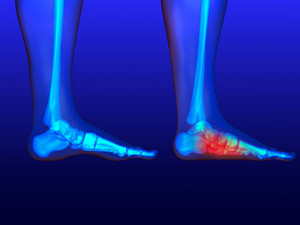 Overpronation occurs when the arch of the foot collapses while bearing weight when a person is walking or standing. This issue is very common in patients who have flexible flat feet. As the arch begins to collapse, this overpronation stresses the feet and can lead to multiple issues. These issues can include plantar fasciitis, heel spurs, metatarsalgia, tendonitis, and bunions. Overpronation can be caused by a variety of factors, including obesity and pregnancy. Patients with overpronation may not feel discomfort early on or at all. Orthotics are often used to support the arch of the foot and treat this condition. Properly fitting footwear that has a firm heel should also be worn. If you are struggling with the overpronation of your foot, make sure to consult with a podiatrist.
Overpronation occurs when the arch of the foot collapses while bearing weight when a person is walking or standing. This issue is very common in patients who have flexible flat feet. As the arch begins to collapse, this overpronation stresses the feet and can lead to multiple issues. These issues can include plantar fasciitis, heel spurs, metatarsalgia, tendonitis, and bunions. Overpronation can be caused by a variety of factors, including obesity and pregnancy. Patients with overpronation may not feel discomfort early on or at all. Orthotics are often used to support the arch of the foot and treat this condition. Properly fitting footwear that has a firm heel should also be worn. If you are struggling with the overpronation of your foot, make sure to consult with a podiatrist.
If you have any concerns about your feet, contact Brian Shwer, DPM from Southaven Foot Clinic. Our doctor can provide the care you need to keep you pain-free and on your feet.
Biomechanics in Podiatry
Podiatric biomechanics is a particular sector of specialty podiatry with licensed practitioners who are trained to diagnose and treat conditions affecting the foot, ankle and lower leg. Biomechanics deals with the forces that act against the body, causing an interference with the biological structures. It focuses on the movement of the ankle, the foot and the forces that interact with them.
A History of Biomechanics
Modern technological improvements are based on past theories and therapeutic processes that provide a better understanding of podiatric concepts for biomechanics. Computers can provide accurate information about the forces and patterns of the feet and lower legs.
Understanding biomechanics of the feet can help improve and eliminate pain, stopping further stress to the foot.
If you have any questions please feel free to contact our office located in Southaven, MS . We offer the newest diagnostic and treatment technologies for all your foot and ankle needs.
 Running is a wonderful sport for maintaining your cardiovascular health and overall fitness, however, it can increase your risk of getting a foot or ankle injury. Two of the most common running injuries are plantar fasciitis and Achilles tendonitis. Plantar fasciitis often presents itself as a stabbing pain in the heel, or pain in the arch of the foot. This is an overuse injury that is the result of repetitive stress on the plantar fascia, a ligament that runs along the bottom of the foot and connects the heel bone to the toes. Achilles tendonitis is an inflammation of the Achilles tendon, a fibrous cord that connects the muscles in the back of your calf to the heel bone. Achilles tendonitis is caused by small tears in the tendon due to overuse. Many running injuries can be prevented by regularly warming up, doing strengthening exercises, resting, and wearing the right shoes. However, if you find yourself with a persistent foot or ankle injury, it is suggested that you seek the care of a podiatrist.
Running is a wonderful sport for maintaining your cardiovascular health and overall fitness, however, it can increase your risk of getting a foot or ankle injury. Two of the most common running injuries are plantar fasciitis and Achilles tendonitis. Plantar fasciitis often presents itself as a stabbing pain in the heel, or pain in the arch of the foot. This is an overuse injury that is the result of repetitive stress on the plantar fascia, a ligament that runs along the bottom of the foot and connects the heel bone to the toes. Achilles tendonitis is an inflammation of the Achilles tendon, a fibrous cord that connects the muscles in the back of your calf to the heel bone. Achilles tendonitis is caused by small tears in the tendon due to overuse. Many running injuries can be prevented by regularly warming up, doing strengthening exercises, resting, and wearing the right shoes. However, if you find yourself with a persistent foot or ankle injury, it is suggested that you seek the care of a podiatrist.
Exercising your feet regularly with the proper foot wear is a great way to prevent injuries. If you have any concerns about your feet, contact Brian Shwer, DPM of Southaven Foot Clinic. Our doctor will treat your foot and ankle needs.
How to Prevent Running Injuries
Many common running injuries are caused by overuse and overtraining. When the back of the kneecap starts wearing out and starts causing pain in your knee, this is commonly referred to as runner’s knee. Runner’s knee is a decrease in strength in your quadriceps and can occur if you’re not wearing properly fitted or supporting shoes. To prevent runner’s knee, focusing on hip strengthening is a good idea, as well as strengthening your quads to keep the kneecaps aligned.
What Are Some Causes of Running Injuries?
- One cause of a common running injury is called iliotibial band syndrome.
- Plantar fasciitis is also another common injury.
- Stress fractures can occur from overtraining, lack of calcium, or even your running style.
Best Ways to Prevent Running Injuries
- Wear footwear that fits properly and suits your running needs.
- Running shoes are the only protective gear that runners have to safeguard them from injury.
- Make a training schedule. Adding strengthening exercises as well as regular stretching can help keep you strong and limber and can lessen the possibility of injuries.
- Stretching keeps muscles limber; this will help you gain better flexibility.
If you have any questions please feel free to contact our office located in Southaven, MS . We offer the newest diagnostic and treatment technologies for all your foot and ankle needs.